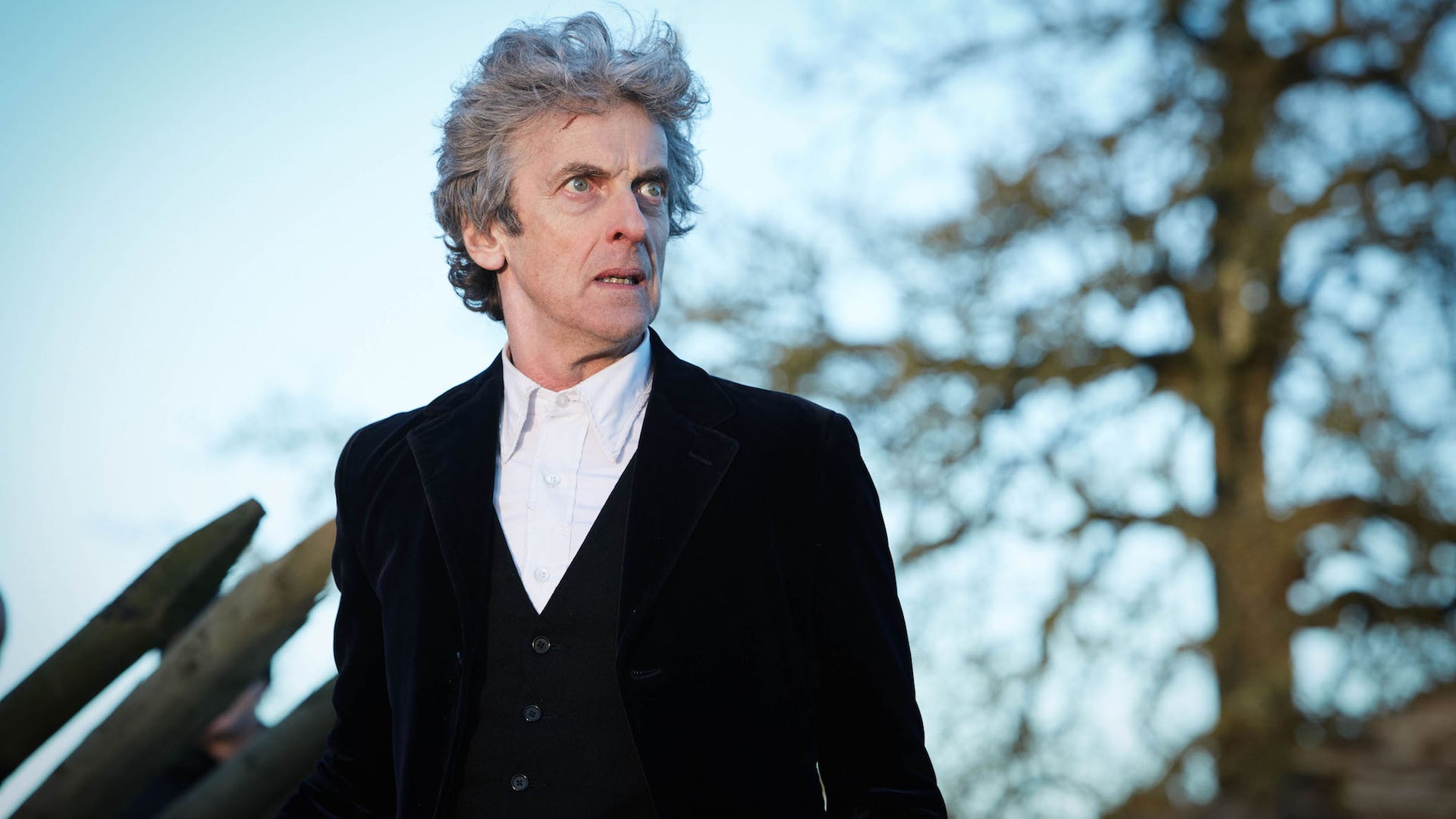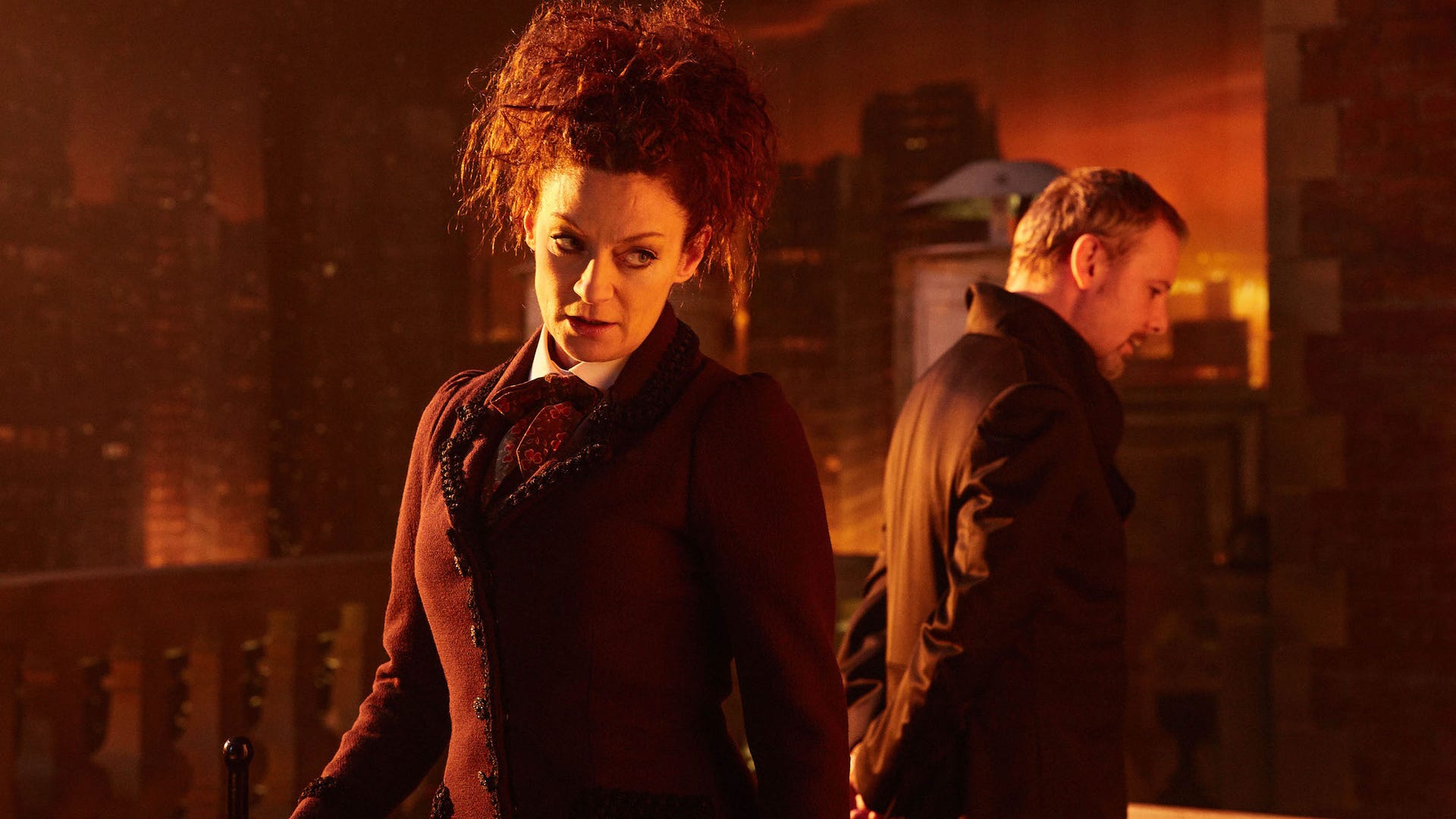Join or Sign In
Sign in to customize your TV listings
By joining TV Guide, you agree to our Terms of Use and acknowledge the data practices in our Privacy Policy.
Doctor Who Ends on a Quiet, Reflective Note as Peter Capaldi Prepares to Exit
Where did the time go?
It feels like just yesterday we said goodbye to Matt Smith, yet here we are already preparing for Peter Capaldi's exit from Doctor Who. It seems almost impossible that it's been four years and three seasons since he took over the role that's been played by more than a dozen men over the course of more than 50 years. But it's true, and now we're standing on the precipice of major change, both in front of and behind the camera. Where has the time gone?
That's a question many of us will be asking ourselves after watching "The Doctor Falls." While not as strong as the hour that preceded it, the Season 10 finale was an emotional farewell to a man who won't officially depart the role of the kind and righteous Doctor until the Christmas special later this year. It was also a fitting end to one of the show's best seasons to date (despite the fact that the season sagged in the middle).
The episode borrowed a page from Season 9's "Hell Bent" and was a quieter, more somber affair than expected, trading in exciting thrills for impassioned speeches, brave endings and contemplations on transformations. Although the hour never reached the level of action promised in the trailers -- the Cybermen once again were not terrifying villains, and there was no major showdown between the Doctor (Peter Capaldi), the Master (John Simm) and Missy (Michelle Gomez) -- that's OK. The days of "bigger is better" are long gone and this was, rather properly, an hour for reflection -- in more ways than one.
Doctor Who: Peter Capaldi's 10 best episodes
In his last regular season writing appearance, departing showrunner Steven Moffat successfully delivered an emotional gut punch featuring multiple callbacks -- and not just to the events of the season or even Capaldi's time in the TARDIS. There were references reaching all the way back to the beginning of Doctor Who, including an appearance from the First Doctor, this time played by David Bradley, who is reprising the role he played in An Adventure in Space and Time and will star alongside Capaldi in the Christmas special.
There were also more references to other Doctor's first or last words -- raise your hand if you teared up at the echo of David Tennant's "I don't want to go" -- and there was a montage of the memorable companions who've been by the Doctor's side since the show was revived in 2005 (it's unclear as to why some of his unofficial companions, like Jenny or Madame Vastra, made the cut while someone like Arthur Darvill's Rory did not). Bill (Pearl Mackie) not realizing she was a Cyberman also echoed back to Oswin Oswald (Jenna Coleman) discovering she was a Dalek. There were familiar moments like this throughout the episode.
It makes sense that Moffat, who's been with the new series since its first season, would want to revisit the long life of Doctor Who as he prepares to depart the series after the Christmas special. There's no one more closely associated with the era of Nu Who than he is, having written a number of fan favorite episodes before taking over as showrunner from Russell T. Davies in 2010. And just as it was fun to watch him deconstruct the series for comedy in "World Enough and Time," it was nice to see him use the long history of the show for dramatic effect here.

Peter Capaldi, Doctor Who
Simon Ridgway/BBC America
One aspect of the series' history that never changes is the Doctor's affinity for speeches. His brilliant mind and his words are his greatest weapons -- and the man loves to hear himself talk. But Capaldi's Doctor specifically should be remembered for the way his speeches tended to strip the Doctor down to his rawest, purest, most emotional form. The one from the finale in which he explains to the Master why it is he fights when he knows the odds aren't in his favor will likely be remembered for quite a while; not just because of what is said, but because Capaldi's commanding presence once proves why he was absolutely the right man for the job.
The Master's return to Doctor Who is also the series' darkest hour in years
"Winning? Is that what you think it's about?" he said. "I'm not trying to win. I'm not doing this because I want to beat someone or because I hate someone or because I want to blame someone. It's not because it's fun. God knows it's not because it's easy. It's not even because it works, because it hardly ever does. I do what I do because it's right, because it's decent, and above all, it's kind. It's just that. Just kind. If I run away today, good people will die. If I stand and fight, some of them might live. Maybe not many, maybe not for long. You know, maybe there's no point in any of this at all, but it's the best I can do. So I'm going to do it. And I will stand here doing it till it kills me."
We didn't need to hear this to understand why it is the Doctor races across time and space to save people time and again -- we've always known -- but the Master has always fancied himself better than the Doctor and the human beings the Doctor loves so much. So when the Doctor put Time Lords on equal footing with humanity by working his magic with the Cybermen (you shouldn't have let him hit all those buttons!), this sent the Master and Missy fleeing out of a sense of self-preservation... That is, until Missy fought her basic instincts and belatedly made the decision to stand with the Doctor.

Michelle Gomez and John Simm, Doctor Who
Simon Ridgway/BBC America
Of course, her decision to fatally wound the Master before leaving -- something the Doctor would never have done -- ultimately revealed she hasn't fundamentally changed. It's just that she finally understands the Doctor is right, and that's progress. Unfortunately, her decision also made it impossible for her to join the Doctor as the Master then shot her in the back in retaliation. That the two versions of the villainous Master betrayed and destroyed each other is a rather fitting end for the character -- they are their own worst enemy -- but we shouldn't be surprised if another version appears in the future. No one is ever gone for good on this show.
All the marathons happening this July Fourth weekend
That sentiment is why Bill's ending -- she was saved by and reunited with Heather, the girl from the Season 10 premiere -- was left up in the air. It was a bold move to turn Bill into a Cyberman in "World Enough and Time," and it's important for the show take these dramatic risks. But Doctor Who is not a deeply dark series. We could argue about the loopholes the series constantly uses to extract itself from the corners it paints itself into, but for once it wasn't wibbly-wobbly, timey-wimey handwaving that set Bill free, so let's just be thankful that one of the show's best companions isn't stuck inside a Cyberman's body any longer.
Besides, we have bigger things to worry about.
The Doctor has lived for thousands of years. He's lost best friends and watched other friends choose to leave. He's waged war. He's carried the weight of the Time Lords on his shoulders. He's made the difficult decisions no one else was willing to make. And he did it all because it was the right thing to do. He did all of these things without hope, without witness and without reward -- to quote the man himself. But he was done.
The Doctor was ready and willing to die for good on that ship. And honestly, the Doctor probably deserves an ending as noble as the one he nearly got in "The Doctor Falls." But it's not yet his time. The world needs men and women like the Doctor, men and women who will stand up and fight not because it's easy or because they want to win, but because it's the right thing to do. How do we reconcile this knowledge with the fact the Doctor doesn't seem to be willing to regenerate anymore?
In an hour centered on transformations, in an hour where Bill's mind rebelled against Cyberman programming and where Missy was strong enough to betray the Master, the idea that the Doctor is unwilling to regenerate is an interesting one. He says he doesn't want to "keep on becoming somebody else," but the truth is: the Doctor may look different on the outside, he may have new quirks and personality traits with each regeneration, he may go through different things each time, but he's still the same man where it counts. He's still the same man who would fracture time to save Clara, who would burn up a sun to say goodbye to Rose, who would do almost anything for the people he loves and for the people he doesn't even know.
And that's why, when the time comes to say goodbye to Peter Capaldi in the Christmas special -- because as much as Twelve wants to stay, we know he can't -- it'll all be OK. It's going to hurt like hell like it always does, but we'll persevere.
Doctor Who will return this Christmas on BBC America.
